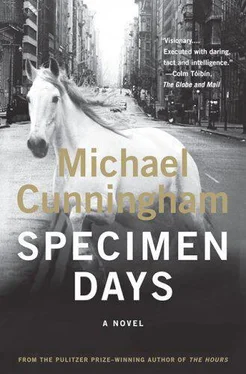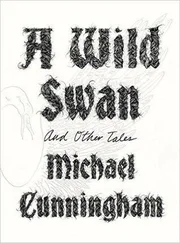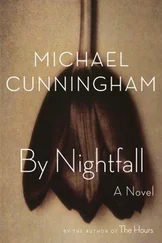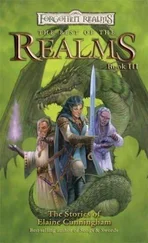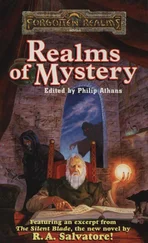Michael Cunningham - Specimen Days
Здесь есть возможность читать онлайн «Michael Cunningham - Specimen Days» — ознакомительный отрывок электронной книги совершенно бесплатно, а после прочтения отрывка купить полную версию. В некоторых случаях можно слушать аудио, скачать через торрент в формате fb2 и присутствует краткое содержание. Город: New York, Год выпуска: 2005, ISBN: 2005, Издательство: Farrar, Straus and Giroux, Жанр: Современная проза, на английском языке. Описание произведения, (предисловие) а так же отзывы посетителей доступны на портале библиотеки ЛибКат.
- Название:Specimen Days
- Автор:
- Издательство:Farrar, Straus and Giroux
- Жанр:
- Год:2005
- Город:New York
- ISBN:0-374-70515-1
- Рейтинг книги:4 / 5. Голосов: 1
-
Избранное:Добавить в избранное
- Отзывы:
-
Ваша оценка:
- 80
- 1
- 2
- 3
- 4
- 5
Specimen Days: краткое содержание, описание и аннотация
Предлагаем к чтению аннотацию, описание, краткое содержание или предисловие (зависит от того, что написал сам автор книги «Specimen Days»). Если вы не нашли необходимую информацию о книге — напишите в комментариях, мы постараемся отыскать её.
Specimen Days — читать онлайн ознакомительный отрывок
Ниже представлен текст книги, разбитый по страницам. Система сохранения места последней прочитанной страницы, позволяет с удобством читать онлайн бесплатно книгу «Specimen Days», без необходимости каждый раз заново искать на чём Вы остановились. Поставьте закладку, и сможете в любой момент перейти на страницу, на которой закончили чтение.
Интервал:
Закладка:
He awoke. It was still dark. He could still hear the wind from his dream.
He knew immediately that Catareen had died.
She lay rigid. Her eyes were closed. The orange no longer shone through the thin membranes of her eyelids. Simon put his hand on her small, smooth head. It was cool as a stone.
He wondered: Had she hastened her death in the hope that he might still be able to get aboard the ship? Could a Nadian do something like that? It was impossible to say.
The ship. He might still have time to get aboard, then.
He ran from the room, down the stairs, and outside. He knew. Of course he knew. Still, he shouted, “Wait.”
The ship was one hundred feet or more above the ground, quivering as its reactor prepared to deliver the blast. It floated, humming. Its three spider legs had been retracted. It was a perfect silver platter, trembling as if it might flip over, girdled with green-gold porthole lights. Centered in its underside was the circle of the reactor, deepening from blinding white to volcanic red. Ten, nine, eight…
Simon ran to the empty place where the ship had been. He shouted, “Wait, please, wait.” He stood shouting in the middle of the scorched circle the ship had left behind. He knew it was too late. Even if they could see him (they could not see him), there was no way to bring the ship down again, no rope or ladder to unfurl.
“No,” he shouted. “Please, oh, please, wait for me.”
The reactor fired. Simon was consumed by red light, obliterated by it. He was momentarily made only of light, blinded, shouting. It was not hot; it was only bright. The reactor made a small sound, a mechanical cough, and then the ship hurtled upward so fast it seemed to vanish entirely. By the time the red light had dissipated, by the time Simon’s sight was restored, it was already impossible to tell which light was the ship and which was one of the nearer stars.
Simon stood looking up at the sky. He fixed on a moving light that might have been the ship, though he could not be sure. The sky was full of starlike lights that moved, that could have been fly craft from Eurasia or secret weapons aimed at various enemies or alien ships bearing pilgrims from one world to another. The sky was full of travelers. Simon remained under the stars and the points of moving light shouting, “Wait, wait, wait, oh, please, wait for me.”
When he was finished shouting there was nothing to do but go back into the empty house. He returned to the bedroom. He lay awake beside Catareen’s body, which contained no trace of her. She had departed entirely. Her flesh had joined the inanimate objects of the room; it was no more than the chair or the lamp.
He lay beside the body until the room began to pale with the first light of morning.
By the time the sun was fully risen, he had dug her grave. He chose a place behind the farmhouse, in the shade of the tree they had looked at together through the bedroom window. When the hole was deep enough he went and lifted her body and carried it outside. She weighed almost nothing. In death, she was like a collapsed umbrella. He held her body carefully, with her head pressed to his chest, though of course it made no difference. As he carried her across the yard the horse nickered. It wanted to be fed.
Before he fed the horse he took Catareen to the grave, sat awkwardly on its crumbly edge, then slid down and laid her on the cool, moist earth. It didn’t seem right to put dirt directly onto her face. He thought at first he would go back into the house for a cloth but decided instead to remove his shirt and drape it over her head. He thought she should have something of his in the grave with her, though of course it made no difference.
When her features were shrouded by his T-shirt he reached up, took a handful of earth, and spread it over her face. He worked carefully and gently. He added another handful, and another. He covered her handful by handful until she was entirely blanketed by earth. Until she had disappeared. Then he hoisted himself out of the grave and shoveled the rest of the dirt in.
The horse whinnied insistently. It needed to be fed. He went and fed the horse.
The sun was high by then. The heat of the day had begun. He was alone here, with the horse and Catareen’s grave. The others were on their way to a new world, one that might be beautiful or might be barren.
He made breakfast for himself and washed the dishes. It was nine-thirty on a summer morning in an empty house on the outskirts of Denver. He walked onto the porch and looked at what was there. Grass and sky. A single finger of cloud, dissolving in the searing blue above the distant mountain range.
It was time to go.
He saddled the horse. He was drawn more to the idea of riding the horse than he was to the prospect of driving away in the Winnebago. The Winnebago could stay here, in the heat and the silence. The sun would rise and fall and rise again on the truck and the house, on the scorched circle where the spaceship had been, on Catareen’s unmarked grave.
He mounted the horse and rode out. He would ride west, he thought. He would ride to California. He would ride in that direction. He and the horse might die of starvation or the sun. They might be attacked by nomads and zealots. Or they might get to the Pacific. They might go all the way to the far edge of the continent and stand on a beach before what he imagined to be a restive, infinite blue. Assuming of course that the ocean was still untainted. There was no way of knowing, was there?
He rode west. He rode until the farm was out of sight, until he was no one and nothing but a man on a horse in a vast emptiness, a world of grass and sky. The horse walked steadily on. It was unconcerned. It was only walking. It had no idea about anything.
Simon and the horse would have to get across the mountains. What were they called? The Rockies. People had done that, though. People who were now long dead had ridden horses across these mountains and reached whatever waited for them on the other side. They had buried their dead. They had carried with them bowls that bore messages written in forgotten languages. They had carried memories of a pond or of a tree perfectly centered in an accidental view or of being left behind as others sailed away. They had harbored unreasonable hopes. They had built cities that rose and fell and might for all he knew be rising again.
The woman was in the ground. The child was on his way to another world. Simon was on his way someplace, and there might be nothing there. No, there was something everywhere. He was going into his future. There was nothing to do but ride into it.
A pure change happened. He felt it buzzing through his circuits. He had no name for it.
He said aloud, “The earth, that is sufficient, I do not want the constellations any nearer, I know they are very well where they are, I know they suffice for those who belong to them.”
He rode on then, through the long grass toward the mountains.
Acknowledgments
As novelists go, I am not a particularly private or solitary individual. I tend to talk about work in progress with a small body of trusted friends, and have the good sense to listen to their ideas. I also show various drafts to various readers, and each helps to make the novel in question stronger and truer than I’d be capable of making it on my own.
I extend my deepest gratitude to Diane Cardwell, Judy Clain, Frances Coady, Joel Connarroe, Stacey D’Erasmo, Marie Howe, Joy Johannessen, Daniel Kaizer, James Lecesne, Michael Mayer, Adam Moss, Christopher Potter, and Derrick Smit. Also crucial readers, and much more than that, are my agent, Gail Hochman, and my editor, Jonathan Galassi. Marianne Merola sees to it that my books are well published outside the United States. Susan Mitchell, Jeff Seroy, Timothy Mennel, Sarita Varma, and Annie Wedekind have been heroic in their efforts to make this book look beautiful, to catch its errors of fact and infelicities of diction, and to convey it into the world.
Читать дальшеИнтервал:
Закладка:
Похожие книги на «Specimen Days»
Представляем Вашему вниманию похожие книги на «Specimen Days» списком для выбора. Мы отобрали схожую по названию и смыслу литературу в надежде предоставить читателям больше вариантов отыскать новые, интересные, ещё непрочитанные произведения.
Обсуждение, отзывы о книге «Specimen Days» и просто собственные мнения читателей. Оставьте ваши комментарии, напишите, что Вы думаете о произведении, его смысле или главных героях. Укажите что конкретно понравилось, а что нет, и почему Вы так считаете.
